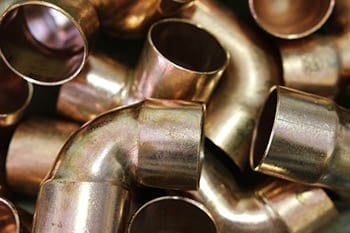
 Do you think your copper plumbing might need repair?
Do you think your copper plumbing might need repair?
While copper plumbing is extremely common and offers several advantages to homeowners (in that it’s resistant to ultraviolet rays and bacteria, durable and flexible, and generally safer in natural disasters), there are several issues that can occur with this type of material that will necessitate repair. Prompt repair is always recommended, as plumbing problems tend to only get worse (and much more expensive to fix). Here are some of the most common copper plumbing repair issues to look for.
Corrosion and Leaks
By far the most prevalent issue that homeowners face with copper plumbing is the “pinhole leak,” which essentially results from a localized copper corrosive action called pitting corrosion.
While copper is relatively resistant to corrosion, it is metal and thus will corrode under the right conditions, usually when the copper oxidizes from contact with other substances. Copper pipe corrosion usually goes undetected until you have a leak, and these small leaks can actually become quite destructive, causing everything from drywall damage to mold buildup.
Pipe inspection is always a good preventative measure, particularly if your home is older, as age increases the likelihood that corrosion and pinhole leaks will occur. It’s also good to keep in mind that water that tends to be more acidic will usually worsen any corrosion problems that occur in copper pipes.
Freezing and Bursting
Since copper is a metal and generally has less to give than plastics and other materials, copper plumbing can be vulnerable to bursts due to extreme temperature exposure.If pipes are exposed to cold temperatures, the water inside can freeze and expand, causing the pipe to break. Any pipe burst is considered to be an emergency plumbing repair and needs to be addressed by a professional as soon as possible.
Scaling
Copper plumbing pipes (as well as any other type of metal piping) will inevitably scale over time. This results in buildup inside the pipe that gradually decreases the pipe’s diameter and begins to block the flow of water, decreasing the efficiency of your system. The buildup of scale can also cause corrosion of the pipes and thus should be addressed before the repair gets much more serious (and costly).
Deterioration of Water Quality
When copper plumbing corrodes, the metal itself slowly begins to be dissolved into the drinking water, often at microscopic levels. Initially, this will produce a bitter and/or metallic taste in the water and can even begin to result in green stains on plumbing fixtures. If you suspect copper content in your water, it’s important to have the issue repaired at once, as it can eventually lead to illness.
Call Donnelly’s today [hls_phone_number] – we are the solution for all your plumbing problems! You can also click the banner below to schedule service online at any time.